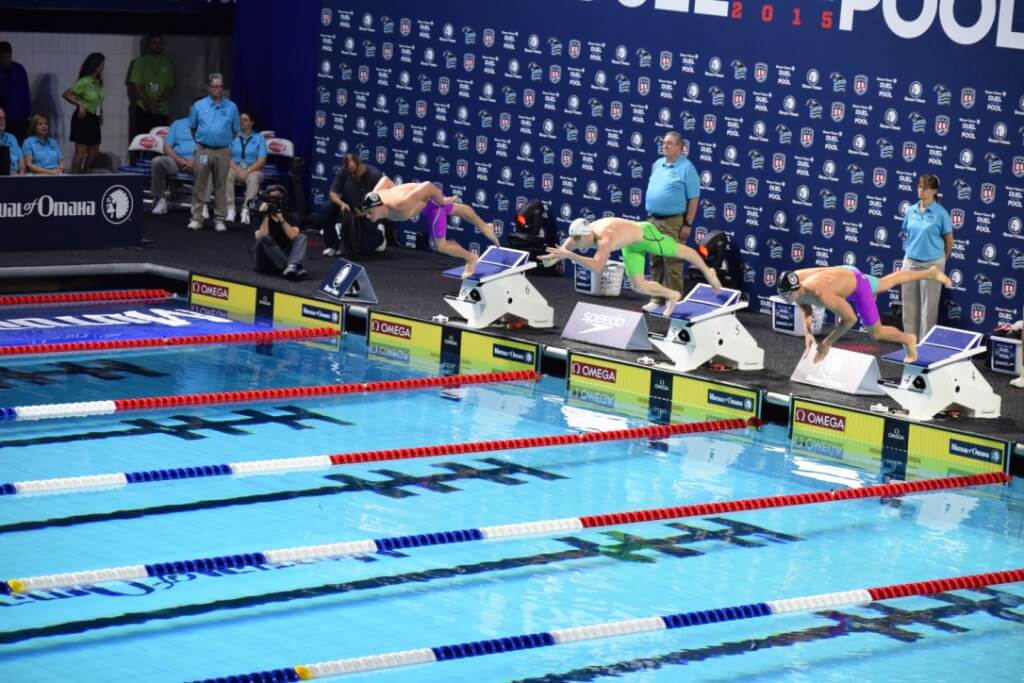Time of Day ‘Strongly Affects’ Performance of Olympic Swimmers

A study by a Stanford postdoctoral fellow published last week finds that Olympic swimmers are more than a third of a second faster, on average, in the evening than in the morning.
The study is titled, “Gold, silver or bronze: circadian variation strongly affects performance in Olympic athletes.” It was performed by Renske Lok, Ph.D., a psychiatry fellow who studies circadian biology at Stanford, during her time at the University of Groningen in the Netherlands. Her research was published in the journal Scientific Reports.
Lok analyzed the times of 144 swimmers (72 men, 72 women) in the finals of the Athens, Beijing, London and Rio Olympics, choosing swimming because of the limited variables affecting performance and normalizing the data based on race type (heat, semifinal, final). The analysis of those swims concluded that times were slower in the morning and faster in the afternoon, by an average of 0.39 seconds. The best results for Olympic swimmers came around 5 p.m. local time.
From the paper’s abstract:
Performance was strongly affected by time-of-day, showing fastest swim times in the late afternoon around 17:12 h, indicating 0.32% improved performance relative to 08:00 h. This study reveals clear effects of time-of-day on physical performance in Olympic athletes. The time-of-day effect is large, and exceeds the time difference between gold and silver medal in 40%, silver and bronze medal in 64%, and bronze or no medal in 61% of the finals.
“The magnitude of the effect is pretty big,” Lok said. “The difference was amazing, considering that athletes train at all times of the day.”
Given her background, Lok focused on circadian effects as a cause. Biological factors like body temperature, blood glucose, oxygen saturation levels and various hormone (insulin, cortisol, testosterone, etc.) levels have regular peaks according to our internal body clock, which affect when people hit peaks and troughs in their physical and mental functioning. People’s tendencies in this area, their chronotype – defined in the paper as “describing an individual’s biological optimal timing for activity and sleep” – roughly hew to what we think of as early birds (or larks) and night owls.
The research has practical applications. While chronotype is a relatively stable trait, athletes can adjust their sleep and meal schedules over shorter periods to optimize training and performance. It’s especially important in an Olympic or World Championships setting, where the timing of finals isn’t determined for the good of athletic performance but to maximize TV visibility. Those differences in timing, such as the morning finals and evening prelims at the Beijing Olympics that will recur at the 2021 Tokyo Games, provided Lok with variables to study.




Thanks Mathew- a good read.
Interesting. Which came first, evidence of elite swimmers swimming faster at 5 PM, or finals sessions scheduled for 5 PM.
Funny because my swimmer performs best if he has prelims in the morning and finals in the evening. He will drop both times. If he only swims evening he tends not to drop at all ?
Kelly Spencer Williams Psychological?
As an ex coach I don’t really find this unusual. My experience indicates that the top swimmers only swim to place in the heats, but turn in the top times in the finals. This does’nt apply to the slower swimmers because they are swimming in the hopes of making the finals. If his selected swimmers were mostly from the faster swimmers his conclussions would (I think) be right.
Agreed. Former us nationals qualifier typing, the implication that biology is at play here… I mean it might be true but this data set wouldn’t prove it at all. If you’re a lock-in for top 3, you swim pre lims to make finals and save your real energy to win at night.
If the researchers had spoken to even one elite swimmer or coach in doing this analysis, that would have been apparent. Sigh…
Hi Alan, as the author of the paper I’d like to point out that we analyzed the data in a linear mixed model, in which you can correct for any variation not due to time of day (in this case, motivational differences). So, the data in the second figure describes time of day effects independent of trying to make it to the finals or turn in top times in finals. The article does not necessarily address the difference between heats, semi-finals and finals, but that there are differences due to time of day that are not often taken into account.
So true
My son is a fairly good sprinter and he vastly prefers evening races. He has always said that he is faster in the evening. Interesting article!
Interesting read, thanks.
Maybe it is engrained in swimmers to perform better at night after doing evening finals since 8 yrs old?
Jess Prokas
If everyone swims faster late in the day than they do early, it makes for slower times but doesn’t change the race. But I’ll bet it’s not everyone. Some swimmers, perhaps a minority, will do better in the morning than in the evening. For them, morning finals are better, evening not so much. OR, say everyone swims faster later, but some swim much faster, and for some there is not so much of a difference. In the end, time of day ends up advantaging some over others, depending on when.